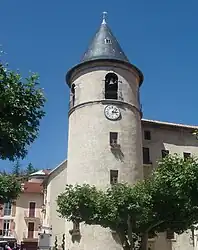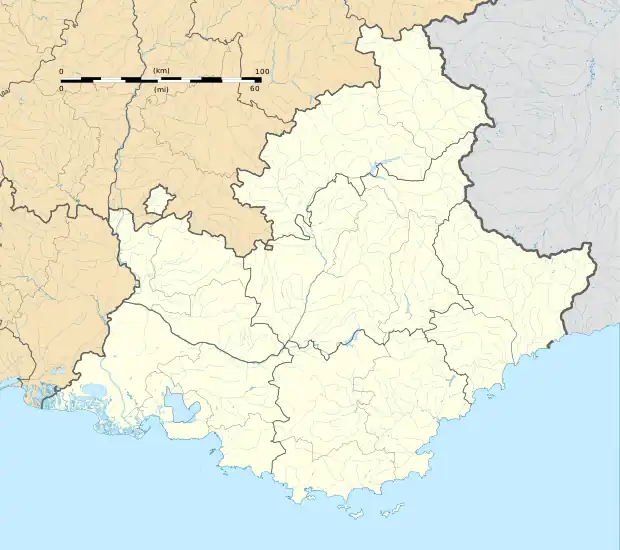Veynes | |
|---|---|
 Town hall | |
 Coat of arms | |
Location of Veynes | |
 Veynes  Veynes | |
| Coordinates: 44°32′06″N 5°49′27″E / 44.535°N 5.8242°E | |
| Country | France |
| Region | Provence-Alpes-Côte d'Azur |
| Department | Hautes-Alpes |
| Arrondissement | Gap |
| Canton | Veynes |
| Intercommunality | Buëch-Dévoluy |
| Government | |
| • Mayor (2020–2026) | Christian Gilardeau-Truffinet[1] |
| Area 1 | 42.6 km2 (16.4 sq mi) |
| Population | 3,238 |
| • Density | 76/km2 (200/sq mi) |
| Time zone | UTC+01:00 (CET) |
| • Summer (DST) | UTC+02:00 (CEST) |
| INSEE/Postal code | 05179 /05400 |
| Elevation | 771–1,815 m (2,530–5,955 ft) (avg. 814 m or 2,671 ft) |
| 1 French Land Register data, which excludes lakes, ponds, glaciers > 1 km2 (0.386 sq mi or 247 acres) and river estuaries. | |
Veynes (French pronunciation: [vɛn]; Occitan: Vèina) is a commune in the Hautes-Alpes department in southeastern France. It developed largely as a minor rail hub, at the crossing of two lines.
Population
| Year | Pop. | ±% p.a. |
|---|---|---|
| 1968 | 3,578 | — |
| 1975 | 3,330 | −1.02% |
| 1982 | 3,178 | −0.67% |
| 1990 | 3,148 | −0.12% |
| 1999 | 3,093 | −0.20% |
| 2007 | 3,170 | +0.31% |
| 2012 | 3,149 | −0.13% |
| 2017 | 3,182 | +0.21% |
| Source: INSEE[3] | ||
See also
References
- ↑ "Répertoire national des élus: les maires" (in French). data.gouv.fr, Plateforme ouverte des données publiques françaises. 13 September 2022.
- ↑ "Populations légales 2021". The National Institute of Statistics and Economic Studies. 28 December 2023.
- ↑ Population en historique depuis 1968, INSEE
Wikimedia Commons has media related to Veynes.
This article is issued from Wikipedia. The text is licensed under Creative Commons - Attribution - Sharealike. Additional terms may apply for the media files.